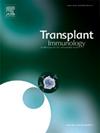Outcomes with chimeric antigen receptor T-cell therapy in Rheumatological disorders: A systematic review
IF 1.6
4区 医学
Q4 IMMUNOLOGY
引用次数: 0
Abstract
Background
Chimeric antigen receptor T cell (CAR-T) therapy is an emerging form of immunotherapy that has recently gained recognition for treating hematological malignancies. This successful utilization of CAR-T therapy has attracted interest in its application in refractory rheumatological diseases. Here, we will review the use of CAR-T therapy in rheumatological diseases.
Methods
Per PRISMA guidelines, a comprehensive literature search was performed on PubMed, Cochrane, and ClinicalTrials.gov using keywords for ‘CAR-T cell therapy’ and ‘Rheumatological diseases’ from inception to December 9, 2023. After screening 2977 articles, six studies reporting outcomes of CAR-T cell therapies in patients with underlying autoimmune /rheumatological diseases. Descriptive analysis was performed to represent demographics and clinical outcomes.
Results
A total of 101 adult patients from six studies were included in this systematic review. The median age of the participants was 50.8 years (IQR: 14.875), with ages ranging from 18 to 83 years. The included studies comprised 2 case reports, 1 case series, one observational study, and two clinical trials. The studies were conducted globally, including USA, Germany, and China. The underlying rheumatologic conditions were systemic lupus erythematosus (17.8 %), rheumatoid arthritis (23.8 %), myasthenia gravis (13.8 %), neuromyelitis optica (11.9 %), and others (32.7 %). The target of CAR-T therapy included CD-19 in four studies and B cell maturation antigen (BCMA) in two studies. All the patients were on prior therapy, including glucocorticoids and disease-modifying antirheumatic drugs. Follow-up ranged from a month to 1.5 years. Most of the studies reported improvement in the symptoms and decline in serological biomarkers of the underlying disease. The notable outcomes in the included studies were a 100 % response rate in five out of six studies. Grade 1 and 2 cytokine release syndrome (CRS) was observed in five studies. Only one study reported Grade 3 or higher CRS. 2 patients (1.98 %) developed neurotoxicity among the adverse effects.
Conclusion
CAR-T cell therapy is a paradigm shift in managing rheumatologic diseases, with symptomatic improvement and biochemical control of these diseases. Although preliminary evidence indicates promising results, long-term follow-up and prospective clinical trials are needed to establish optimal timing and assess the safety and efficacy of CAR-T immunotherapy.
风湿病嵌合抗原受体 T 细胞疗法的疗效:系统综述。
背景:嵌合抗原受体 T 细胞(CAR-T)疗法是一种新兴的免疫疗法,最近在治疗血液恶性肿瘤方面获得了认可。CAR-T 疗法的成功应用引起了人们对其在难治性风湿病中应用的兴趣。在此,我们将回顾 CAR-T 疗法在风湿病中的应用:根据 PRISMA 指南,我们在 PubMed、Cochrane 和 ClinicalTrials.gov 上使用 "CAR-T 细胞疗法 "和 "风湿病 "关键词进行了全面的文献检索,检索时间从开始到 2023 年 12 月 9 日。在筛选了 2977 篇文章后,有六项研究报告了 CAR-T 细胞疗法在自身免疫/风湿病患者中的疗效。对人口统计学和临床结果进行了描述性分析:本系统综述共纳入了六项研究中的 101 名成年患者。参与者的中位年龄为 50.8 岁(IQR:14.875),年龄从 18 岁到 83 岁不等。纳入的研究包括 2 个病例报告、1 个系列病例、1 个观察性研究和 2 个临床试验。这些研究在全球范围内进行,包括美国、德国和中国。基础风湿病包括系统性红斑狼疮(17.8%)、类风湿性关节炎(23.8%)、重症肌无力(13.8%)、神经脊髓炎(11.9%)和其他(32.7%)。四项研究的CAR-T疗法靶点包括CD-19,两项研究的靶点包括B细胞成熟抗原(BCMA)。所有患者之前都接受过治疗,包括糖皮质激素和改善病情抗风湿药物。随访时间从一个月到 1.5 年不等。大多数研究报告称,患者的症状有所改善,潜在疾病的血清生物标志物有所下降。所纳入研究的显著结果是,六项研究中有五项的应答率达到 100%。五项研究观察到 1 级和 2 级细胞因子释放综合征(CRS)。只有一项研究报告了 3 级或以上的 CRS。2名患者(1.98%)出现了神经毒性等不良反应:结论:CAR-T 细胞疗法是治疗风湿病的一种范式转变,可改善症状并控制这些疾病的生化指标。尽管初步证据显示效果良好,但仍需要长期随访和前瞻性临床试验来确定最佳时机,并评估 CAR-T 免疫疗法的安全性和有效性。
本文章由计算机程序翻译,如有差异,请以英文原文为准。
求助全文
约1分钟内获得全文
求助全文
来源期刊

Transplant immunology
医学-免疫学
CiteScore
2.10
自引率
13.30%
发文量
198
审稿时长
48 days
期刊介绍:
Transplant Immunology will publish up-to-date information on all aspects of the broad field it encompasses. The journal will be directed at (basic) scientists, tissue typers, transplant physicians and surgeons, and research and data on all immunological aspects of organ-, tissue- and (haematopoietic) stem cell transplantation are of potential interest to the readers of Transplant Immunology. Original papers, Review articles and Hypotheses will be considered for publication and submitted manuscripts will be rapidly peer-reviewed and published. They will be judged on the basis of scientific merit, originality, timeliness and quality.
 求助内容:
求助内容: 应助结果提醒方式:
应助结果提醒方式:


